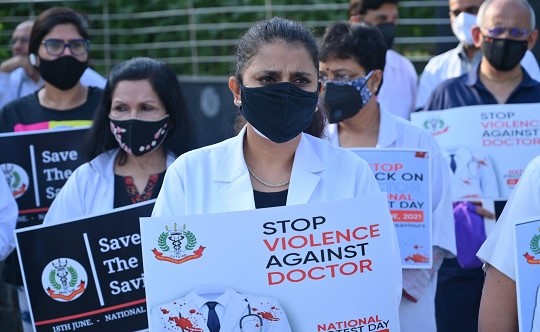July 1: A doctor at Mumbai’s Kokilaben Dhirubhai Ambani Hospital was allegedly assaulted by a patient’s relatives in the hospital’s Intensive Coronary Care Unit (ICCU), as they were not satisfied with the treatment that their relative had received in the hospital. One of the accused allegedly slapped a doctor who was on duty.FIR was registered at Versova police station after the hospital registered a complaint against 3 people involved in this whole incident.
An officer from Versova police station said that the relatives not only threatened to harm the hospital staff but also the other patients who were undergoing treatment.“Their 70-year-old mother has been undergoing treatment for some infection at the hospital since June 23. The relatives had been fighting the hospital staff regarding the bill amount and refused to pay up. The hospital had earlier made a police complaint in that matter as well,” he added.
“We are deeply saddened and confirm the recent incident of assault at Kokilaben Dhirubhai Ambani Hospital, involving a junior member of our dedicated medical staff by the relatives of a patient. The family has been exhibiting aggressive behaviour towards the staff, prompting us to inform the authorities earlier. Following the assault, we took immediate action by registering an FIR and will fully cooperate with the authorities in their investigation. In this case, the patient has been under our care for six months, despite the family’s volatile behaviour.” the hospital said in a statement.
In recent years, the safety of healthcare workers has become a growing concern worldwide. The unfortunate incident at the Hospital in Andheri serves as a reminder of the risks healthcare professionals face while carrying out their noble duties. This assault highlights the urgent need to address the escalating incidents of violence against healthcare workers and ensure a safe working environment for those dedicated to saving lives.
I. Increased Vulnerability and Stress
Healthcare workers, including doctors, nurses, and support staff, operate under immense pressure and stress. Long working hours, high patient loads, and the emotional toll of dealing with life-or-death situations increase their vulnerability to confrontations and violent outbursts from frustrated or dissatisfied individuals.
II. Frustration and Misplaced Expectations
This incident underscores the issue of misplaced expectations and a lack of understanding among patients and their families. In an era of instant gratification and misinformation, patients and their relatives sometimes harbour unrealistic expectations, leading to frustration when outcomes do not align with their hopes. This frustration can manifest in verbal and physical assaults on healthcare workers.
III. Lack of Security Measures and Support
Many healthcare settings lack appropriate security measures to protect healthcare workers. Insufficient security personnel, ineffective crowd control, and inadequate training on conflict resolution leave healthcare professionals vulnerable to potential attacks. Furthermore, the absence of legal frameworks and swift justice systems intensifies the problem, as perpetrators often go unpunished.
IV. Importance of Communication and Patient Education
Enhancing communication and patient education play crucial roles in preventing violence against healthcare workers. Effective communication between healthcare providers and patients, with transparent explanations of treatment options, risks, and limitations, can help manage expectations and reduce frustrations. Patient education programs that emphasize the complexities of healthcare processes and promote empathy can foster better understanding and respect for healthcare professionals.
V. Strengthening Legal Protection and Security Measures
To ensure the safety of healthcare workers, there is a need to strengthen legal protection and implement robust security measures. This includes enacting specific laws that criminalize violence against healthcare professionals and taking legal processes to deliver swift justice. Additionally, healthcare facilities must invest in security personnel, training programs for de-escalation techniques, and the implementation of surveillance systems.
The incident at Kokilaben Dhirubhai Ambani Hospital serves as a distressing reminder that healthcare workers are increasingly vulnerable to violence. Protecting those who dedicate their lives to caring for others is not just morally incorrect, but also vital for maintaining the quality of healthcare services. By addressing the root causes of violence, fostering effective communication, and implementing security measures, we can create an environment where healthcare workers can carry out their duties without fear of assault. It is crucial for society as a whole to recognize the value of healthcare professionals and collectively work towards creating a culture of respect, appreciation, and safety within our healthcare systems

 The incident at Kokilaben Dhirubhai Ambani Hospital serves as a distressing reminder that healthcare workers are increasingly vulnerable to violence. Protecting those who dedicate their lives to caring for others is not just morally incorrect, but also vital for maintaining the quality of healthcare services.
The incident at Kokilaben Dhirubhai Ambani Hospital serves as a distressing reminder that healthcare workers are increasingly vulnerable to violence. Protecting those who dedicate their lives to caring for others is not just morally incorrect, but also vital for maintaining the quality of healthcare services.










.jpeg)




.jpeg)

.jpg)













